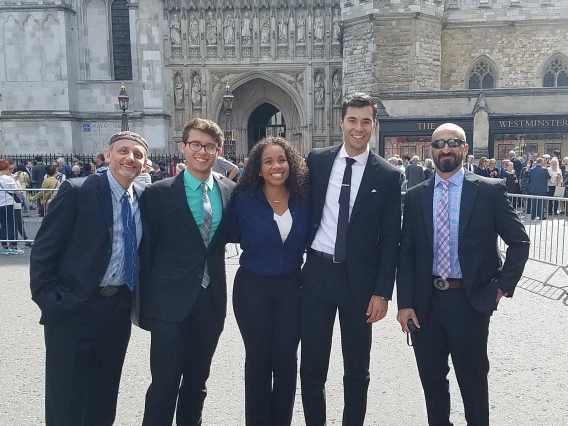
Though Westminster Abbey is the final resting place for Stephen Hawking’s remains, in a fitting tribute, the iconic cosmologist’s voice is continuing into space, beamed toward a black hole.
For a delegation of professors and students from the University of Arizona – lucky winners of a Hawking Foundation lottery to admit 1,000 members of the public to the ceremony – witnessing the formal Service of Thanksgiving was a once-in-a-lifetime experience and a chance to reflect on humanity’s pursuit of knowledge.
For Ken McAllister, College of Humanities Associate Dean of Research and Program Innovation, the road to London for Hawking’s interment began in mid-May when he saw a Gizmodo news item about Lucy Hawking’s plan to offer some tickets to the public through an open submission and selection process.
“I thought it was a curious decision to have a lottery,” McAllister said. “It was just a simple online form, and you could apply as an individual or a school. I entered on behalf of the College of Humanities, thinking how great it would be for a group of humanists to attend what I imagined—wrongly it turned out—would be a science-heavy event.”
About 25,000 people applied for the lottery. News that his application had won came to McAllister a couple weeks later, while he was in the auditorium watching the “Humanities Innovators in a Tech World” lectures. In disbelief, he shared the email with colleagues.
“I thought it might be a hoax at first,” he said. “It seemed so unlikely.”
The invitation allowed for faculty and students, so McAllister and Judd Ruggill, head of the Department of Public and Applied Humanities, reached out to the Dorrance Family Foundation, for help selecting several of their of best undergraduates. Within a few days, three Dorrance Scholars, all from Arizona high schools, were chosen to attend: Carlos Weiler, a chemical and environmental engineering senior; Jacob Nathaniel Brown, a psychology junior; and Onieda Hudson, a nutritional sciences junior. Two of the three would be visiting London for the first time.
“To see a new place in the context of this historic moment was an opportunity to think about science and the humanities—not to mention life and death—and their connection to place,” Ruggill said.
Weiler, who received the invitation on his birthday, called the trip “incredible.”
“Hawking was a person who questioned a lot of things, even his own ideas. He left questions that are still left unanswered and people are trying to answer to gather a better understanding of the cosmos. It drove home the importance of asking questions.”
Hudson said she was awed by the ceremony, its significance, and its historic location.
“I am a religious person, so I completely admired and respected Westminster Abbey. It was impactful to not just see the structure itself, but be involved in a hosted ceremony,” she says. “Funerals give family and friends the chance to say goodbye, and religion brings hope that when someone goes it is not the last time they will see them, which is exactly what gives people the courage to carry on with life.”
Hawking’s ashes were interred between the graves of two other iconic scientists, Charles Darwin and Isaac Newton.
After the ceremony, each attendee was given a CD containing a special piece of music by the Greek composer Vangelis, with a recorded message of peace and hope from Hawking himself. The European Space Agency broadcast the music and message into space during the service, beaming the signal toward the nearest black hole, 1A 0620-00, a destination 3,500 years away.
“When we see the earth from space we see ourselves as a whole; we see the unity and not the divisions. It is such a simple image, with a compelling message: one planet, one human race,” Hawking said. “We are here together, and we need to live together with tolerance and respect.
We must become global citizens.”
Hearing this message, delivered in Hawking’s distinctive, computerized voice, offered a fitting final lesson from the great scientist, McAllister said.
“That statement spoke to the fact that Hawking himself understood that all the science behind exploring the universe exists because we’re trying to understand who we are,” he said. “Hawking’s work wasn’t an abstract undertaking. It was a life-long exploration of what it means to be human.”

